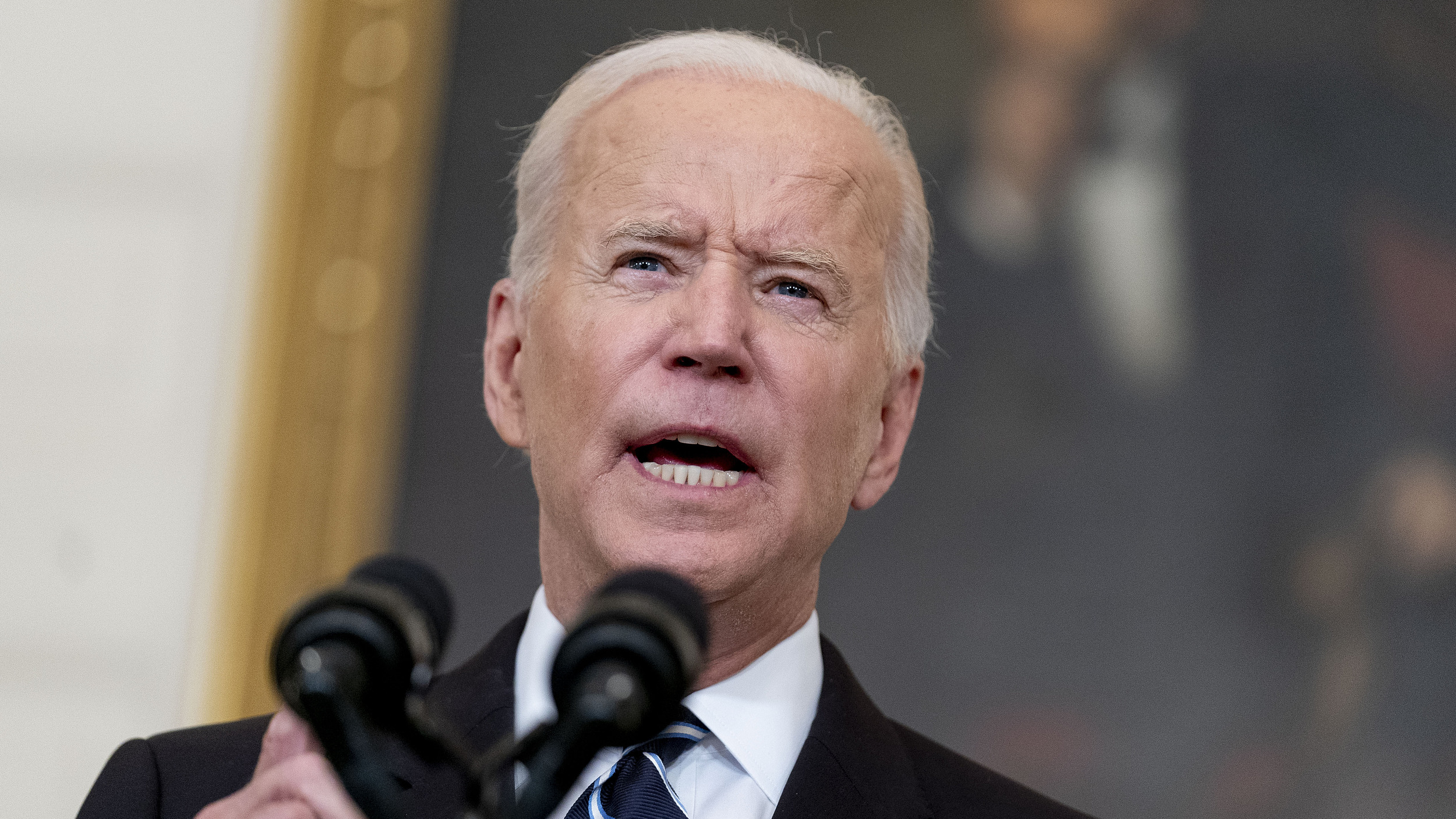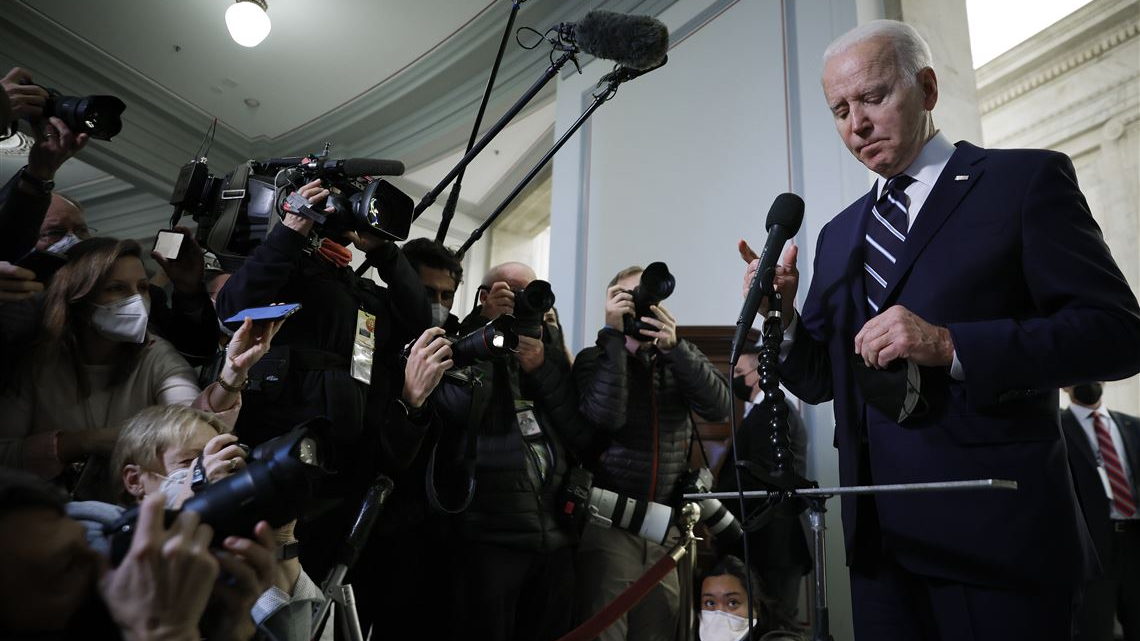
U.S. President Joe Biden. /CFP
U.S. President Joe Biden. /CFP
Editor's note: Radhika Desai is a professor of political studies at the University of Manitoba in Canada. The article reflects the author's opinions and not necessarily the views of CGTN.
U.S. President Joe Biden took office a year ago after the most bitterly fought presidential campaign in memory. The contestation of its result culminated in an assault on Capitol Hill, evoking fears of civil war and fascism. Understandably, Biden's inaugural speech had to urge a rattled nation to "join forces, stop the shouting and lower the temperature" and unite.
A year later, three things are clear. First, the Biden presidency is stymied. Its list of failures extends from the embarrassment of the Alaska meeting to the disaster of the withdrawal from Afghanistan, from the stalled vaccine campaign to the renewed threat to U.S. women's abortion rights, from climate agenda held hostage to the oil lobby to a foreign policy agenda captured by the military industrial complex.
Second, while Biden's less than dynamic, uncharismatic leadership and his political debt to the billionaires who funded his elections are important factors, the U.S.'s partisan division, which he failed to overcome or soften, is arguably the proximate reason. With the Republican Party remaining firmly in Donald Trump's grip, not only is bipartisanship difficult if not impossible, under its pull on "moderate" Democrats like Joe Manchin and Kyrsten Sinema also resist Biden's agenda.
Third, this division is not just about Republican and Trumpian obduracy. The Democrats' equal if not greater commitment to neoliberalism has produced and maintained the economic and social divisions on which it is built. Trump may have harnessed a strong and unwavering minority of its discontents to a right wing and divisive agenda.
However, he would not have been able to do so had Biden and the Democrats abandoned neoliberalism and galvanized the majority of those who have paid the price of neoliberal policies. The sad reality is that Biden received the highest number of votes for any president not by mobilizing people but by outspending Trump by about a third. The total 2020 election spending is nearly $14 billion, which is more than double of 2016's sum. This reliance on short-circuiting the political process with big money is what makes the Biden presidency not just stymied but also self-stymieing.

U.S. President Joe Biden talks to reporters in the Russell Senate Office Building on Capitol Hill in Washington, D.C., U.S., January 13, 2022. /Getty
U.S. President Joe Biden talks to reporters in the Russell Senate Office Building on Capitol Hill in Washington, D.C., U.S., January 13, 2022. /Getty
The political frustration is real. Biden's planned $3.5 trillion American Families Planremains frustrated even after being whittled down to $1.75 trillion. Even his infrastructure plan – and infrastructure bills have a history of broad bipartisan support – had to be nearly halved from $2.3 trillion to $1.2 trillion to pass and did so with less bipartisanship than any other. His voter rights bill, designed to reduce voter suppression, particularly of African American voters, is stalled.
No wonder Biden's press conference to mark the first year of his presidency was so underwhelming. His delivery was just as stilted. His claims about how well his fight against the pandemic was going and how well the economy was doing were clearly based on cherry-picked evidence. However, what came across particularly loudly was how resoundingly he had failed on his unity agenda. Biden repeatedly attacked the Republican abandonment of bipartisanship and alleged that, lacking a positive agenda, they were animated only by a determination to obstruct his legislative efforts.
Given the real possibility that the Democrats may lose control of Congress to Trump's Republicans in the November mid-term elections, Biden proposed to mount a greater personal public relations effort, to bring in outside experts and to campaign.
However, these efforts can only backfire. Lacking charm, with his personal popularity lower at the one year mark than any postwar president except perhaps Gerald Ford, getting out and talking to people about this administration's "achievements" can only be counterproductive, particularly among working people, women and African Americans whose votes got him to power but whom his record has only betrayed. Outside experts can provide expertise but not the political will to address the economic and social divides that underlie the political ones. The will can only be smothered by Biden's reliance on big money for his elections. Finally, given Biden's dismal record, Democratic candidates in the Congressional elections could hardly be blamed for considering him a campaign liability.
The U.S.' political divisions are rooted in economic policies to which both Republicans and Democrats remain committed. In the past, Democrats distinguished themselves by finding ways of throwing a few crumbs the way of America's working people and marginalized groups within the broader neoliberal consensus. However, the room for that is rapidly narrowing. The majority of mainstream commentators are already suggesting that the only way Biden can look less of a failure is to rein in his "overambitious" program, and correct his mistake of "overpromising." To reinforce this, many take the return of inflation to be the signal that government social spending must be curtailed.
This will prevent even the minimal healing of economic and social divides and entrench the political ones more firmly. President Biden's second year can only be more nightmarish than his first.
(If you want to contribute and have specific expertise, please contact us at opinions@cgtn.com.)

